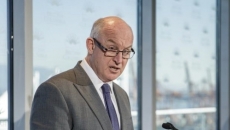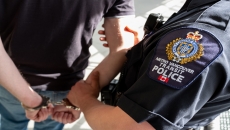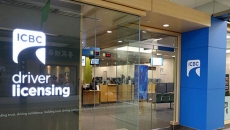OTTAWA - Canada and its allies were shaking off their shock and scrambling to respond on Tuesday after Russian President Vladimir Putin ordered the deployment of Russian troops into eastern Ukraine. Putin’s move followed months of mounting tensions between the West and Russia, and has stoked fears of a new war in Europe. Here is what you need to know about the situation and its impact on Canada:
What’s the latest?
Putin on Monday announced the deployment of Russian troops into two separatist regions on his country’s border with Ukraine, Donetsk and Luhansk. Both regions have already suffered eight years of war after Russia began providing weapons, ammunition and in some cases clandestine troops to separatist rebels in 2014. The ensuing conflict between pro-Russian forces and the Ukrainian military has so far left more than 14,000 people dead.
Putin’s decision to send troops into rebel-held regions came after he signed a decree earlier Monday recognizing Donetsk and Luhansk as independent republics. He has said the troops will act as “peacekeepers.” But Ukraine and its Western allies, including Canada, have denounced Russia’s actions, saying they represent yet another gross violation of Ukraine’s independence and territory as well as international law after its illegal annexation of Ukraine’s Crimea peninsula in 2014.
How have Canada and its allies responded?
Prime Minister Justin Trudeau announced late Tuesday that Canada would be deploying 460 additional Armed Forces members to reinforce NATO in Latvia and eastern Europe. It is also imposing economic sanctions against Russian lawmakers and financial institutions, banning any financial dealings with Donetsk and Luhansk and barring the purchase of Russian sovereign debt.
Canada's moves followed similar steps by allies in the U.S. and Europe, with Germany stopping the process of certifying the Nord Stream 2 gas pipeline from Russia — a lucrative deal long sought by Moscow, but criticized by the U.S. for increasing Europe’s reliance on Russian energy. The rest of the European Union also sanctioned Russian lawmakers and officials, financial institutions and defence companies.
What comes next?
Canada and its allies will now likely wait to see the size and scope of Russia’s military incursion into Ukraine and whether it will extend beyond Donetsk and Luhansk. If it does, even heavier sanctions are likely.
However, despite their repeated messages of support for Ukraine, Canada and its allies have repeatedly played down any suggestion they will send troops to reinforce the government in Kyiv. Western powers have long made clear the fate of Ukraine wasn't worth a direct military confrontation with Russia and the possibility of a world war, so sanctions were the only option.
The entire calculus would change if Russia decided to expand the conflict beyond Ukraine and into eastern Europe. Any attack or invasion on a NATO country would almost certainly trigger Article 5 of the alliance’s military treaty, which states that an attack on one is an attack on all. That would bring Canada and its allies into a direct war with Russia.
Why does this matter to Canada?
As a smaller country sitting next to the world’s largest superpower, Canada has a massive stake in ensuring international norms and laws are respected to protect itself and global stability. Those include preventing one country from being allowed to invade or otherwise seize parts of another country. The fear is that ignoring Russia’s actions weakens this prohibition, leading to the increased possibility of war in other places.
There are also fears that Russia’s designs could extend beyond just Ukraine and into Europe. In the months leading up to Russia’s move into Luhansk and Donetsk, Putin had demanded NATO promise to never admit Ukraine into military alliance’s ranks. Yet the Russian president had also demanded NATO withdraw all its troops from the Baltics and other former Soviet republics, which would include 540 Canadian soldiers currently based in Latvia. Canada and its fellow NATO allies have refused both requests. While Ukraine is not part of NATO, a Russian attack on Latvia or another NATO member would automatically put Canada at war.
The fate of Ukraine is also a personal matter for the more than 1.3 million Canadians of Ukrainian descent, many of whom still have strong connections to their ancestral land and are opposed to Russian interference in the country. Because of its size, the community is seen as having significant influence in parts of Ottawa, and is demanding Canada support Ukraine.
Meanwhile, Russia’s actions have destabilized financial markets around the world amid fears of a wider war in Europe. That affects people's investments and livelihoods.






